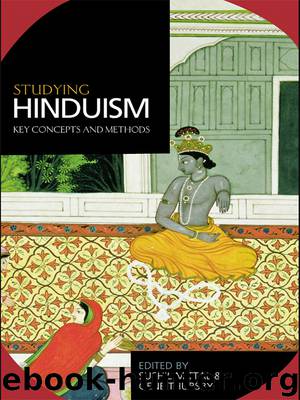Studying Hinduism by Mittal Sushil; Thursby Gene;

Author:Mittal, Sushil; Thursby, Gene;
Language: eng
Format: epub
Tags: ebook, book
Publisher: Routledge
Published: 2011-08-18T16:00:00+00:00
Mīmāṃsā
The major schools of Early Vedic Exegesis (Pūrva-Mīmāṃsā) are in substantial agreement with the Vaiśeṣika and Nyāya philosophers regarding the nature and functions of the manas. They agree, for instance, that the mind or intellect (these terms for Mīmāṃsā once again are synonymous) is an internal sense organ; that it is atomic in size; that cognitions occur to the mind one at a time; that the mind must be in contact with the ātman and the external sense organs or objects of the inner sense for cognitions to take place; and that the mind falls away on the death of the person, leaving the disembodied ātman entirely unconscious (Cennakesavan 1980: 22). The innovations that the most influential schools of Mīmāṃsā made with regard to the theory of intellect were on the topic of how cognitions arose to self-awareness not through the phenomenon of apperception held by the Naiyāyikas but rather through the self-revealing or self-luminous (svayaṃprakāśa) nature of cognitions.
The Bhāṭṭa school of Mīmāṃsā, named after its forerunning advocate, Kumārila Bhāṭṭa (seventh century CE), embraces a position on self-awareness that makes it the result of an inference. Perceptual cognitions by their very nature, for Kumārila, present their objects faithfully; they do not themselves misrepresent objective forms but rather take on the forms that their objects present (Ślokavārtika 2.80). Such perceptions, through their character as productions of the intellect (bhodakatva), confer on their objects a new property, that of “known-ness” (jñānatā), and it is this property that raises the initial cognition to the level of self-awareness for any subsequent cognition that reflects on it. Kumārila therefore insists that any cognition that is a genuine perception carries a sense of indubitable truth, and if an error is made, it is thought to be because of some defect (doṣa) that impeded the perception or the mistake of a memory for a perception (2.53). The Bhāṭṭa school as a whole tried to marry a heightened sense of certainty in the perceptual process to the model of a transparent and unstructured intellect.
The other major school of Mīmāṃsā was named after Prabhākara, who was Kumārila’s contemporary. The Prabhākaras carried the realist notion of the self-awareness of cognitions much farther than their sister school. It appears that the position of this school on cognitive self-awareness developed from the initial view held by Prabhākara into the generally cited view of his commentator Sālikanātha (Chatterjea 2002: 1–8). According to Prabhākara, when we speak of jñāna, or cognitions, we mean that an immediate awareness (samvit) of an object has taken place, but because that immediate awareness can never itself be known as the perceptual object of another cognition, it is known only through an inference and that inference is what we cognize (Bṛhatītikāśabarabhāṣya 63). The intellect then is always self-aware, but a second-order awareness of this self-awareness can only be attained through reflection. The reason that Prabhākara adopted this complex principle was his conviction that when we recall an experience, for instance, we recall at first only the objective content of
Download
This site does not store any files on its server. We only index and link to content provided by other sites. Please contact the content providers to delete copyright contents if any and email us, we'll remove relevant links or contents immediately.
| Africa | Americas |
| Arctic & Antarctica | Asia |
| Australia & Oceania | Europe |
| Middle East | Russia |
| United States | World |
| Ancient Civilizations | Military |
| Historical Study & Educational Resources |
Cecilia; Or, Memoirs of an Heiress — Volume 1 by Fanny Burney(32067)
Cecilia; Or, Memoirs of an Heiress — Volume 3 by Fanny Burney(31463)
Cecilia; Or, Memoirs of an Heiress — Volume 2 by Fanny Burney(31412)
The Secret History by Donna Tartt(18186)
Sapiens: A Brief History of Humankind by Yuval Noah Harari(13994)
Leonardo da Vinci by Walter Isaacson(12809)
The Radium Girls by Kate Moore(11626)
Sapiens by Yuval Noah Harari(5125)
How Democracies Die by Steven Levitsky & Daniel Ziblatt(4966)
The Wind in My Hair by Masih Alinejad(4849)
Homo Deus: A Brief History of Tomorrow by Yuval Noah Harari(4691)
Endurance: Shackleton's Incredible Voyage by Alfred Lansing(4511)
Man's Search for Meaning by Viktor Frankl(4294)
The Silk Roads by Peter Frankopan(4275)
Millionaire: The Philanderer, Gambler, and Duelist Who Invented Modern Finance by Janet Gleeson(4106)
The Rape of Nanking by Iris Chang(4024)
Hitler in Los Angeles by Steven J. Ross(3803)
The Motorcycle Diaries by Ernesto Che Guevara(3789)
Joan of Arc by Mary Gordon(3787)
